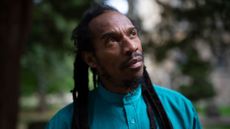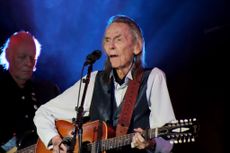Russell Means, 1939–2012
The rabble-rouser who fought for American Indians
Russell Means became the late-20th century’s most famous American Indian at Wounded Knee, where the U.S. Cavalry had massacred more than 150 Lakota Sioux men, women, and children in 1890. To protest past and current injustices, in 1973 Means and some 200 other activists of the American Indian Movement occupied the historical site, on South Dakota’s impoverished Pine Ridge Reservation, leading to a tense 71-day standoff with heavily armed federal forces. Two activists died and a U.S. marshal was left paralyzed in the confrontation, and the following year Means’s highly publicized trial ended when a federal judge dismissed felony charges on grounds of prosecutorial misconduct. Though conditions for Indians didn’t improve, Means considered the occupation a historic success. “Wounded Knee restored our dignity and pride as a people,” he later said.
Born on the Pine Ridge Reservation, “Means was, by his own account, a magnet for trouble,” said The New York Times. He grew up around San Francisco and “drifted into delinquency, drugs, alcoholism, and street fights.” After years of wandering the West, he moved to Cleveland in 1969 to head a center serving the city’s Indian residents. There he met Dennis Banks, who had recently co-founded the American Indian Movement, and he soon became its national director.
With AIM, Means later wrote, he found his purpose: “to get in the white man’s face until he gave me and my people our just due,” said the Los Angeles Times. In 1970 alone, Means “infamously urinated on the top of the head of George Washington” at Mount Rushmore and helped seize control of a replica of the Mayflower in Massachusetts. In later years, Means was imprisoned on obstruction of justice charges; he was stabbed once and shot three times. But he went on to embody American Indian characters in more than 30 films, including The Last of the Mohicans and Natural Born Killers. Acting was just another way, he later said, for him to be a voice for “freedom-seeking Indian people.”
Subscribe to The Week
Escape your echo chamber. Get the facts behind the news, plus analysis from multiple perspectives.

Sign up for The Week's Free Newsletters
From our morning news briefing to a weekly Good News Newsletter, get the best of The Week delivered directly to your inbox.
From our morning news briefing to a weekly Good News Newsletter, get the best of The Week delivered directly to your inbox.
Sign up for Today's Best Articles in your inbox
A free daily email with the biggest news stories of the day – and the best features from TheWeek.com
Create an account with the same email registered to your subscription to unlock access.
-
Why is Tesla stumbling?
In the Spotlight More competition, confusion about the future and a giant pay package for Elon Musk
By Joel Mathis, The Week US Published
-
 How Taylor Swift changed copyright negotiations in music
How Taylor Swift changed copyright negotiations in musicunder the radar The success of Taylor's Version rerecordings has put new pressure on record labels
By Theara Coleman, The Week US Published
-
 Job scams are increasingly common. Here's what to look out for.
Job scams are increasingly common. Here's what to look out for.The Explainer You should never pay for an application or give out your personal info before being hired
By Becca Stanek, The Week US Published
-
 Benjamin Zephaniah: trailblazing writer who 'took poetry everywhere'
Benjamin Zephaniah: trailblazing writer who 'took poetry everywhere'Why Everyone's Talking About Remembering the 'radical' wordsmith's 'wit and sense of mischief'
By The Week UK Published
-
 Shane MacGowan: the unruly former punk with a literary soul
Shane MacGowan: the unruly former punk with a literary soulWhy Everyone's Talking About The Pogues frontman died aged 65
By The Week UK Published
-
 'Euphoria' star Angus Cloud dies at 25
'Euphoria' star Angus Cloud dies at 25Speed Read
By Catherine Garcia Published
-
 Legendary jazz and pop singer Tony Bennett dies at 96
Legendary jazz and pop singer Tony Bennett dies at 96Speed Read
By Devika Rao Published
-
 Martin Amis: literary wunderkind who ‘blazed like a rocket’
Martin Amis: literary wunderkind who ‘blazed like a rocket’feature Famed author, essayist and screenwriter died this week aged 73
By The Week Staff Published
-
 Gordon Lightfoot, Canadian folk legend, is dead at 84
Gordon Lightfoot, Canadian folk legend, is dead at 84Speed Read
By Peter Weber Published
-
 Barry Humphries obituary: cerebral satirist who created Dame Edna Everage
Barry Humphries obituary: cerebral satirist who created Dame Edna Everagefeature Actor and comedian was best known as the monstrous Melbourne housewife and Sir Les Patterson
By The Week Staff Published
-
 Mary Quant obituary: pioneering designer who created the 1960s look
Mary Quant obituary: pioneering designer who created the 1960s lookfeature One of the most influential fashion designers of the 20th century remembered as the mother of the miniskirt
By The Week Staff Published